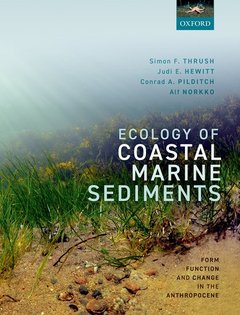Ecology of Coastal Marine Sediments Form, Function, and Change in the Anthropocene
Langue : Anglais
Auteurs : Thrush Simon, Hewitt Judi, Pilditch Conrad, Norkko Alf

Marine sediments dominate the global seabed, creating the largest ecosystem on earth. Seafloor biodiversity is a key mediator of ecosystem functioning, yet critical processes are often excluded from global biogeochemical budgets or simplified to black boxes in ecosystem models. This accessible textbook provides an ideal point of entry into the field, providing basic information on the nature of soft-sediment ecosystems, examples of how and why we research them, the new questions these studies inspire, and the applications that ultimately benefit society. While focussing on coastal habitats (<200m depth) to emphasize process-based experimental studies, it is relevant to the full range of marine sedimentary habitats. The authors describe the interactions between marine organisms and their physical and chemical environment, demonstrating the need for carefully designed research programs and providing the basic steps required to formulate sound ecological questions before applying them to empirical studies of real-world ecosystems. The book reveals the connections between different system components and drivers of change, examining how we can develop knowledge on the biodiversity and functioning of soft sediments and apply it to a better understanding of ecosystem change, human impacts, and effective restoration. Ecology of Coastal Marine Sediments is intended for advanced undergraduate and graduate students who have completed a general ecology course but received no further training in marine science. It will also be useful to both professional researchers and resource managers in marine ecology and environmental science who seek a compact and authoritative introduction to sediment ecology.
Simon Thrush is Director of the Institute of Marine Science and Director of the George Mason Centre for the Natural Environment at the University of Auckland, New Zealand with research interests in marine ecology, marine ecosystem services, resilience and tipping points in marine ecosystems and human impacts on the environment. He has over 30 years' experience in the development and implementation of strategic ecological research to influence resource management and improve societal valuation of marine ecosystems. He has worked in New Zealand, Europe, USA and Antarctica, has contributed to over 200 publications in the peer reviewed scientific literature, and collaborates with colleagues around the world. Judi Hewitt is a programme leader in New Zealand's National Institute of Water and Atmospheric Research. She is a Professor in the Department of Statistics University of Auckland and is a docent in Marine Biology at the University of Helsinki. She has over 30 years of experience in marine research. Her interests include: statistical ecology; scale dependent processes in heterogeneous environments; design and analysis of spatial and temporal variation in populations and communities; measurement and conservation of functional, community and habitat biodiversity; biological and ecological mapping; ecological monitoring; functional, community and habitat biodiversity; ecological risk assessment, particularly of cumulative and multiple stressors. She has contributed to over 140 publications in the peer reviewed scientific literature. Conrad Pilditch is a Professor of Biological Sciences at the University of Waikato, New Zealand. His area of speciality is benthic oceanography/ecology focusing on the processes that influence the structure and function of soft-sediment communities. Specifically, he is interested in how hydrodynamics and benthic organisms interact to affect sediment transport, recruitment, nutrient fluxes, and food supply. He has conducted experiments in a
Date de parution : 02-2021
Ouvrage de 224 p.
19x24.5 cm
Thèmes d’Ecology of Coastal Marine Sediments :
© 2024 LAVOISIER S.A.S.



